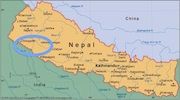The Nayabasti School was completed on September 29, 2012!

The new school!
Nayabasti Community Profile
Nayabasti is part of the Binauna VDC (Village Development Committee) in the Banke District in mid- western Nepal. This community was founded in 1999 by Mr. Aitawari Tharu. Today there are 2,025 people living in 332 households in Nayabasti. The majority follow Hindu religious traditions and 60% also belong to the Tharu ethnic group. The Tharu make up about 6.5% of Nepal’s total population, and until the practice was banned in 2000 many Tharu were forced into a form of indentured servitude called Kamaiya. Nayabasti is 224 km from the buildOn office in Dhangadhi and 35 km from the district headquarters in Nepalgunj. The elected leaders of the community are Mr. Baji Ram Tharu (age 65) and Mr. Palu Oli (age 61). Agriculture is the primary income generating activity in Nayabasti. Families grow rice, wheat, oilseed, and vegetables. Many young people also travel to India to work after their harvest is complete, returning in time to plant for the next season. There is both a children’s club and a women’s group in the village, which conduct programs to raise awareness about early marriage and child labor. The women’s group also has their own income generating and savings program. The climate is warm for most of the year, with cooler temperatures from November to January and the heaviest rains from June to August.
The School Scene in Nayabasti
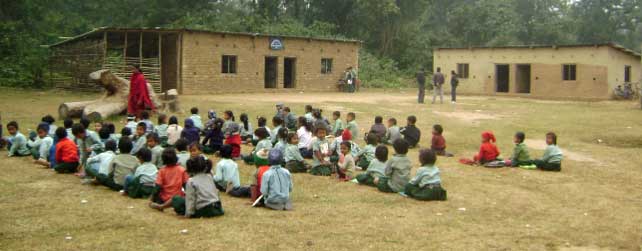
The Old Way - Outdoor classes
There are currently 249 students enrolled in Siddheswari Primary School - 126 girls and 123 boys. They study with 5 teachers in grades 1 through 5. Prior to this project, older students walked 1.5 km to another community to attend classes after finishing their first 5 years of school. Siddheswari Primary School was formally established in Nayabasti just 5 years ago. Before that, all the children in Nayabasti had to walk to another community to attend classes. The new school will allow many more students to attend class in their own village!
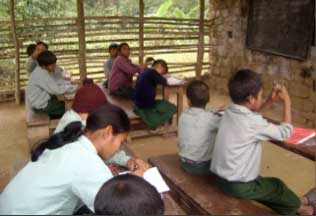
An Old Classroom
The Nayabasti School Project
The Nayabasti school project broke ground on April 16th 2012 and was completed on September 29th 2012. The buildOn school in Nayabasti has 3 classrooms as well as 2 latrines. It has also been furnished with desks and seats and permanent chalkboards. Students began using the new school on October 1st 2012. The people of Nayabasti contributed a total of 1,719 volunteer workdays to the project, which finished behind schedule for two reasons: first, a strike blocked major roads and prevented the delivery of materials for several weeks, and second, this delay pushed the construction into the monsoon season. Community members worked through the rains (at a much slower pace than in the dry season) to finish the school. Before beginning construction they also collected local materials for the project and met with buildOn staff to sign a covenant outlining the following responsibilities:
Community Contribution
• Unskilled labor: 20 workers (10 women and 10 men) per day, six days per week
• Commitment to educating girls and boys equally
• The land on which the school will be built
• High quality local materials: sand, gravel, water & rocks
• Volunteer management committee made up of 12 villagers (six women, six men)
• Lodging for buildOn Field Coordinator and skilled laborers in local homes
• Basic construction tools (picks, buckets, etc.) when available
buildOn Contribution
• Engineering and architecture
• Construction materials (excluding local materials) for school and latrine
• Skilled labor and plans needed to build the school
• Project management (buildOn coordinators)
• Instruction in basic construction techniques
• School furniture
Community Contribution
• Unskilled labor: 20 workers (10 women and 10 men) per day, six days per week
• Commitment to educating girls and boys equally
• The land on which the school will be built
• High quality local materials: sand, gravel, water & rocks
• Volunteer management committee made up of 12 villagers (six women, six men)
• Lodging for buildOn Field Coordinator and skilled laborers in local homes
• Basic construction tools (picks, buckets, etc.) when available
buildOn Contribution
• Engineering and architecture
• Construction materials (excluding local materials) for school and latrine
• Skilled labor and plans needed to build the school
• Project management (buildOn coordinators)
• Instruction in basic construction techniques
• School furniture
A man is like an animal without education. So to be a human being it is necessary to be educated. We can develop our society with the help of education.
- Mr. Janga Bahadur Giri, Community Leader
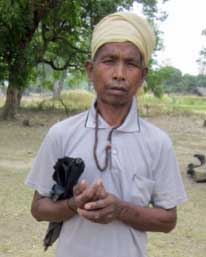
Janga Bahadur Giri
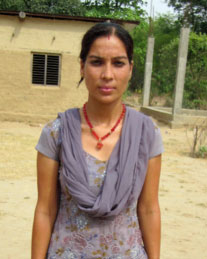
Tilsara Oli
With the support from NGOs and GOs, I would like to upgrade this school to higher secondary level, giving quality education. I would also like to make this school a model school of this area.
- Mrs. Tilsara Oli, Principal
I will help to build this new school so that our kids need not go far away. Our kids can get quality education in our own village. Quality education means progress for our village.
- Mr.Palu Oli, Parent & Community Leader
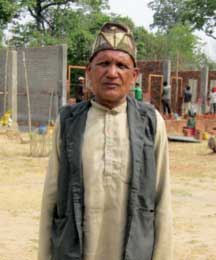
Palu Oli
